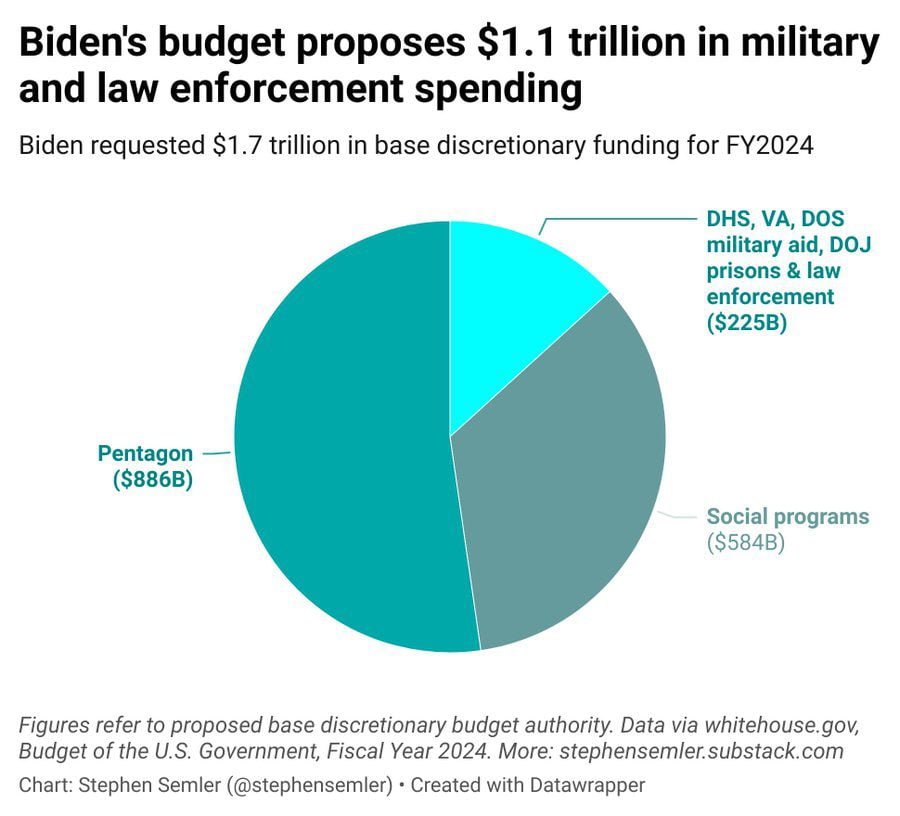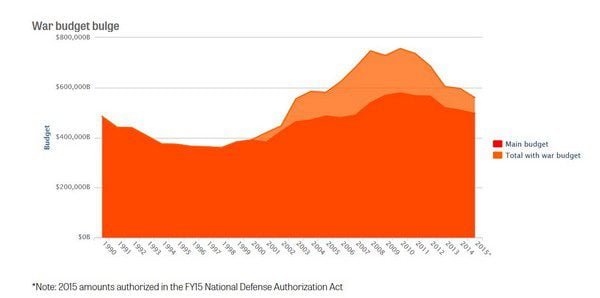
We send Ukraine equipment sitting in our stockpiles. And when we use the money allocated by Congress, we use it to replenish our own stores… equipment that defends America and is made in America: Patriot missiles for air defense batteries made in Arizona; artillery shells manufactured in 12 states across the country — in Pennsylvania, Ohio, Texas; and so much more.
— U.S. President Joe Biden
William Hartung, a writer for Salon, writes:
Joe Biden wants you to believe that spending money on weapons is good for the economy. That tired old myth — regularly repeated by the political leaders of both parties — could help create an even more militarized economy that could threaten our peace and prosperity for decades to come. Any short-term gains from pumping in more arms spending will be more than offset by the long-term damage caused by crowding out new industries and innovations, while vacuuming up funds needed to address other urgent national priorities.
The Biden administration’s sales pitch for the purported benefits of military outlays began in earnest last October, when the president gave a rare Oval Office address to promote a $106-billion emergency allocation that included tens of billions of dollars of weaponry for Ukraine, Israel, and Taiwan. MAGA Republicans in Congress had been blocking the funding from going forward and the White House was searching for a new argument to win them over. The president and his advisers settled on an answer that could just as easily have come out of the mouth of Donald Trump: jobs, jobs, jobs.
Lest you think that Biden’s economic pitch for such aid was a one-off event, Politico reported that, in the wake of his Oval Office speech, administration officials were distributing talking points to members of Congress touting the economic benefits of such aid. Politico dubbed this approach “Bombenomics.” Lobbyists for the administration even handed out a map purporting to show how much money such assistance to Ukraine would distribute to each of the 50 states. And that, by the way, is a tactic companies like Lockheed Martin routinely use to promote the continued funding of costly, flawed weapons systems like the F-35 fighter jet. Still, it should be troubling to see the White House stooping to the same tactics.
Yes, it’s important to provide Ukraine with the necessary equipment and munitions to defend itself from Russia’s grim invasion, but the case should be made on the merits, not through exaggerated accounts about the economic impact of doing so. Otherwise, the military-industrial complex will have yet another never-ending claim on our scarce national resources.
While it can be argued that war is good for the military-industrial complex, filling the coffers of arms manufacturers with billions and billions of dollars, we must ask whether this sort of spending is good for Americans as a whole. Taxpayers directly fund the U.S. military machine. The Israeli bombs falling on innocent Palestinians are bought and paid for by you and me. When we see gruesome pictures of war carnage and death, we must not avert our eyes from our handiwork. We are to blame. Until we force elected officials to change spending priorities, the U.S. government will continue to spend over a trillion dollars a year on defense and security. The total amount of money is limited, so what we fund reveals our priorities; our moral and ethical values.
The official story about military spending and the economy starts like this: the massive buildup for World War II got America out of the Great Depression, sparked the development of key civilian technologies (from computers to the internet), and created a steady flow of well-paying manufacturing jobs that were part of the backbone of America’s industrial economy.
There is indeed a grain of truth in each of those assertions, but they all ignore one key fact: the opportunity costs of throwing endless trillions of dollars at the military means far less is invested in other crucial American needs, ranging from housing and education to public health and environmental protection. Yes, military spending did indeed help America recover from the Great Depression but not because it was military spending. It helped because it was spending, period. Any kind of spending at the levels devoted to fighting World War II would have revived the economy. While in that era, such military spending was certainly a necessity, today similar spending is more a question of (corporate) politics and priorities than of economics.
In these years Pentagon spending has soared and the defense budget continues to head toward an annual trillion-dollar mark, while the prospects of tens of millions of Americans have plummeted. More than 140 million of us now fall into poor or low-income categories, including one out of every six children. More than 44 million of us suffer from hunger in any given year. An estimated 183,000 Americans died of poverty-related causes in 2019, more than from homicide, gun violence, diabetes, or obesity. Meanwhile, ever more Americans are living on the streets or in shelters as homeless people hit a record 650,000 in 2022.
Perhaps most shockingly, the United States now has the lowest life expectancy of any industrialized country, even as the International Institute for Strategic Studies reports that it now accounts for 40% of the world’s — yes, the whole world’s! — military spending. That’s four times more than its closest rival, China. In fact, it’s more than the next 15 countries combined, many of which are U.S. allies. It’s long past time for a reckoning about what kinds of investments truly make Americans safe and economically secure — a bloated military budget or those aimed at meeting people’s basic needs.
What will it take to get Washington to invest in addressing non-military needs at the levels routinely lavished on the Pentagon? For that, we would need presidential leadership and a new, more forward-looking Congress. That’s a tough, long-term goal to reach, but well worth pursuing. If a shift in budget priorities were to be implemented in Washington, the resulting spending could, for instance, create anywhere from 9% more jobs for wind and solar energy production to three times as many jobs in education.
As for the much-touted spinoffs from military research, investing directly in civilian activities rather than relying on a spillover from Pentagon spending would produce significantly more useful technologies far more quickly. In fact, for the past few decades, the civilian sector of the economy has been far nimbler and more innovative than Pentagon-funded initiatives, so — don’t be surprised — military spinoffs have greatly diminished. Instead, the Pentagon is desperately seeking to lure high-tech companies and talent back into its orbit, a gambit which, if successful, is likely to undermine the nation’s ability to create useful products that could push the civilian sector forward. Companies and workers who might otherwise be involved in developing vaccines, producing environmentally friendly technologies, or finding new sources of green energy will instead be put to work building a new generation of deadly weapons.
The United States faces serious domestic problems, yet the only thing that seems to matter to both Republican and Democratic politicians alike is maintaining our standing as the world’s most powerful military, threatening mayhem, violence, and death to any nation-state that dares to threaten our status as the biggest, baddest bully the world has ever known. As a result, virtually every aspect of American life is in decline. From potholes to poorly paid teachers to crumbling infrastructure to runaway medical costs to homelessness to a frayed social safety net, we are in a world of hurt. All of these serious problems (and others) could be fixed by reallocating federal spending, starting with a substantial cut to military spending. Until we are willing to rein in military and security spending, we will NEVER fix the various domestic issues we currently face. There’s money for one or the other, but not both. When given a choice to feed the hungry, house the homeless, and fix crumbling infrastructure or continue our wars and military incursions in countless countries, the choice is clear.
Bruce Gerencser, 66, lives in rural Northwest Ohio with his wife of 45 years. He and his wife have six grown children and thirteen grandchildren. Bruce pastored Evangelical churches for twenty-five years in Ohio, Texas, and Michigan. Bruce left the ministry in 2005, and in 2008 he left Christianity. Bruce is now a humanist and an atheist.
Connect with me on social media:
Your comments are welcome and appreciated. All first-time comments are moderated. Please read the commenting rules before commenting.
You can email Bruce via the Contact Form.






